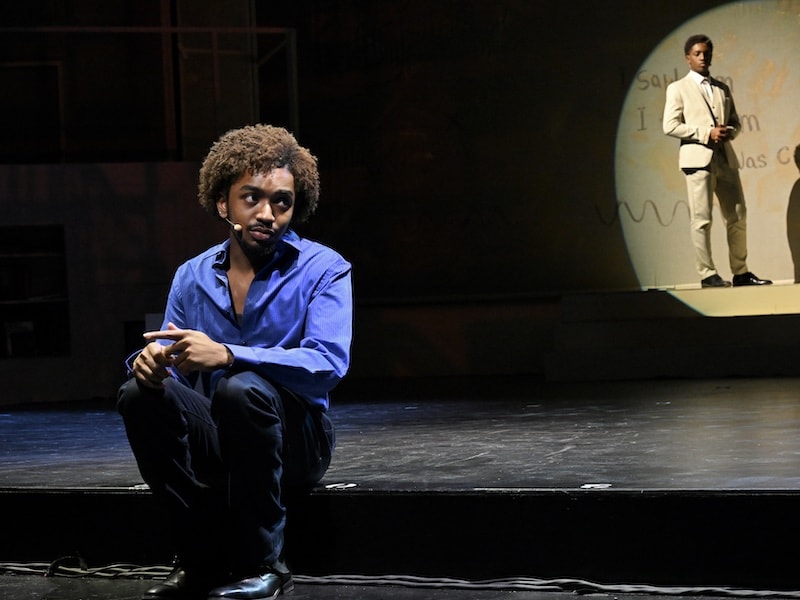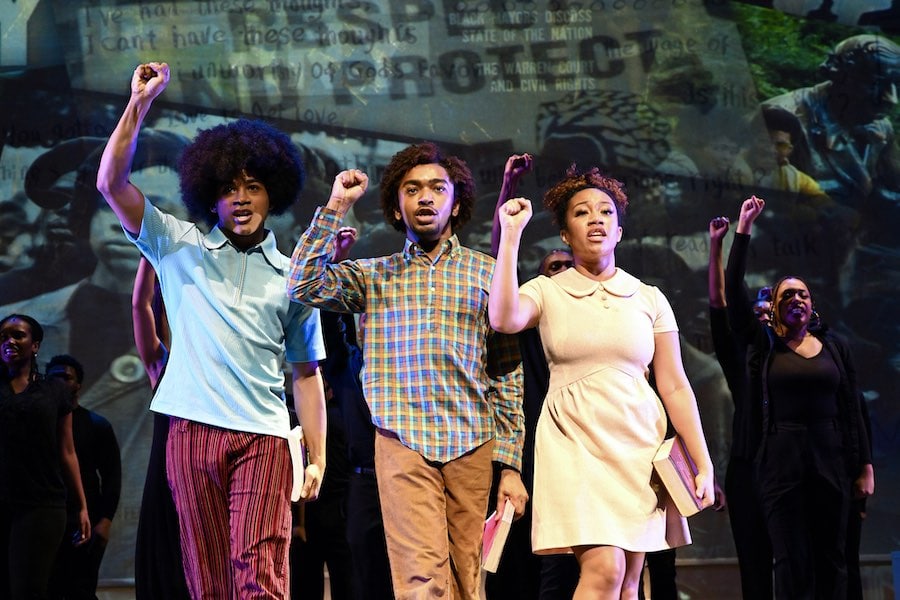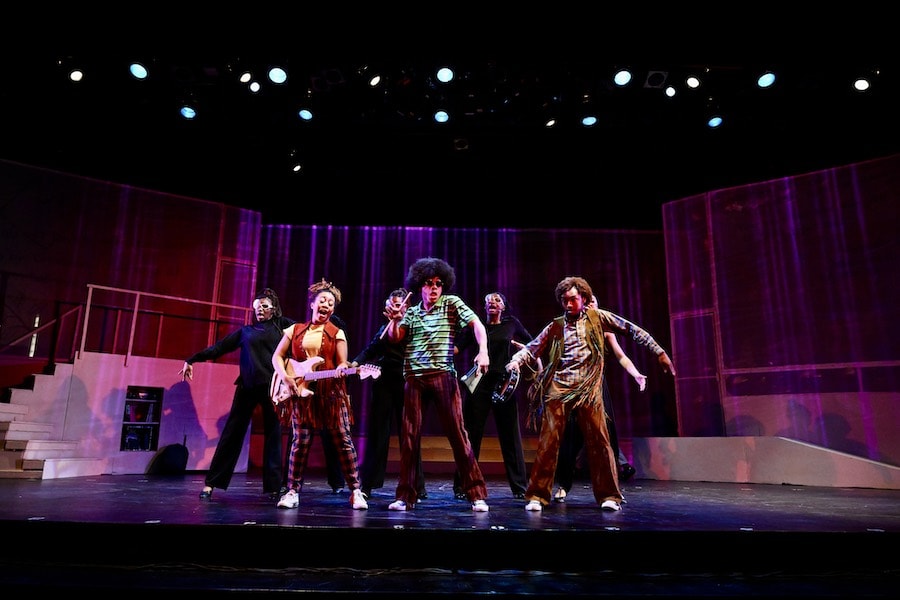By Isaac Welch
Throughout the world, the folklore of Black Americans serves as a foundation of the popular culture we know and enjoy today, bringing context and inspiration to the creative minds that now decorate our history. Folklore as a historical record is pivotal in this aspect. As the world around us continues to change in ways unforeseen by our generation’s forerunners, the necessity becomes ever-present to inscribe new stories and bring light to the narratives that had once lived befogged by ignorance and neglect.
Taking on this responsibility are director and choreographer Dell Howlett and composer Michael McElroy with their new musical Sonnets and Soul. Conceived during the COVID-19 quarantine in 2020, the work addresses the lack of stories akin to their experiences as queer Black men in theater and adjacent arts. Moving away from the Shakespearean motifs that once inspired their collaboration’s title, Howlett and McElroy embark on a journey of healing, begging the question “What if we could go back?”

Sonnets and Soul follows the young Seer, a queer boy played by Kenneth Carter Jr. coming of age in the late 1970s. Son to his mother, Faith (Gabrielle N. Rice), and his father, the Reverend (Jaden Madget), the college-bound high-schooler is set on a path of self-discovery as he finds his heart in conflict between the merits of his future decisions, the fervor compelling him in his sexuality, and the responsibilities ingrained in him as his father’s successor. The jovial yet expectant Reverend has high hopes that his son will follow in his footsteps toward his alma mater and his ministry, leaving Seer guarded against his true desires. As the story unfolds, Seer is emboldened by the support of his mother, who helps both the men in her family come to terms with the fact that Seer’s fate rests in his own hands. Upheld by his acquaintances Romeo (Ethan Hart) and Juliette (Atara F. Romero-Wilson), Seer embraces the challenge of honoring his heart, and through his matriculation begins to explore possibilities for his life outside the realm of his father’s wishes.
This story is told in this musical through the perspective of Seer in the present as a Narrator (Kendrick Jackson) reads on the day of his future wedding pages from an old journal that bore witness to Seer’s past struggle and provenance in his youth. Recounting these storied days, the Narrator — floating above his former self and through scenes as a third party — interjects testimony that brings the significance of each moment to the audience. Through this dichotomy, the audience is given a deeper insight into an already complex character. As Carter acts out Jackson’s reminiscent storytelling, the pair offer a performance devoid of fear. In scenes where Carter skillfully emits Seer’s hesitance and naivety, Jackson reaffirms with grace the wisdom gained. In moments of Carter’s courage, Jackson returns to applaud where he stood ground or laugh at the hardheaded ways he has since matured from. Though the plot covers ground quickly, the audience is anchored by narratives encased in 18 musical numbers.
The play opens with the “Narrator’s Song” then a chronological jump to the first scene, in which the audience is transported from the soft calls of a diary’s opening pages to the pews of a Sunday service. At once, as the second number, “God’s Favor,” reigns, the inimitable reverence that imbues the Black church is comfortably at home on a Saturday afternoon in Howard University’s Ira Aldridge Theatre. This devoted gospel sets the bar to heights that the cast of students from the Chadwick Boseman College of Fine Arts dutifully maintain. The next stand-out number comes during a school talent show when Seer, Romeo, and Juliette perform “Hot Chocolate Love,” an exuberant ode to the era of Funk. With pinpointed dance moves and provocative songwriting, the trio of cronies brings to the present the free-spirited and fully embodied aura of the 1970s Black teenager. Accentuated by Brandee Matthies’ costuming, this character-defining act earns Hart and Romero-Wilson their praises and gives Seer his trusted allies for the rest of the musical.

Forgoing parental approval, this number blossoms as a seedling spelling out the conflict that is to unfold between Seer and his father. The loving yet stubborn and domineering Rev is a familiar portrayal of Black fatherhood, illustrating the generational discrepancies often endured by those with stories similar to Seer’s. Jaden Madget’s courageous embodiment of this character brings the necessary thematic tension that is created with Rev’s role in the musical. He allows his individual talents to shine during the number “Don’t Mourn for Me,” opening a window to Rev’s fervent heart and encouraging the healing of broken bonds.
Written by McElroy — who has performed in Sunday in the Park with George and Next to Normal and composed for Disaster! The Musical and Street Corner Symphony — these numbers beg the same level of greatness as the Broadway stages he’s set foot upon. Heartfelt and pouring from the souls of these young and extremely talented collegiate actors, the vocal performances throughout the show reach a level of such professionalism that could cause viewers to forget that these numbers were rehearsed by undergraduates rushing between office hours and exams. Performances like these catapult the production over the heights its creators have established, and as the show proceeds, it becomes clear that these young actors are headed for similar destinations.
Supplementing these performances, McElroy and Howlett’s use of the Crew as both backing voices and as live utility demonstrates equal parts innovation and creativity. Woven into Howlett and associate director Lashawnda Iya Ifanike Batts’ choreography are graceful maneuvers that double as stage manipulations, with a cohort of Crew members slipping seamlessly between roles from stagehands to choir members, prop passers to a student body, with delicacy and little waste in their movements. There come moments in McElroy’s numbers where these Crew members take on opportunities to let their individual talents shine, and as they are seized, impressions are made.
The graphic projections by Dylan Uremovich and spotlightings by lighting designer Alberto Segarra give the stage dimensionality and purvey a deeper element to its storytelling. Evoked by call and response, viewers are stimulated and invited to partake in the personal experience of McElroy’s writing. Each new setting is further realized by dialogue that will reign familiar to those who learned life’s tribulations from the same environments.

Consisting of a single stationary structure, Nadir Bey’s minimalist set design allows space for the audience to imagine each new setting. For a play whose subjects are deeply personal, allowing this freedom to imagine serves as an advantage, allowing audience members to fill in the openings in the setting descriptions with memories of their own high school hallways, dorm rooms, and cousins’ backyards. Familiar scenes of the family cookout, the school talent show, or the college bar string this show together in its joys with an endeared nostalgia, while at other points harkening in levity to systems and beliefs of eras behind us. Together, these junctures paint a realistic picture of the world Seer must navigate to unearth the truths that will define him. These details, liberties taken by Howlett and McElroy, are what allow Sonnets and Soul to resonate so deeply with the audience who, throughout this performance, were alive and active in their viewership.
The stories of marginalized peoples are characterized by their vitality, as they serve as a means of preservation of cultures constantly defending themselves from erasure. The utilization of culturally stapled dialogue, call and response, and allusion to eras past all work in favor to tell the story of Seer, whose trial and transformation is a narrative accessible to all walks. Brought to exist by the efforts of undergraduates, this level of excellence belongs in its own category. Sown by visions and expressions of Howlett and McElroy, this cast of HBCU students led by Howard University’s prolific production company brings the very life to their performance that these stories need. In this aptly titled musical, every ounce of passion is felt.
Running Time: Approximately two hours and 15 minutes, including a 15-minute intermission.
Sonnets and Soul played February 21–24 and February 27–March 1, 2024, presented by the Chadwick A. Boseman College of Fine Arts Department of Theatre Arts
performing at the Ira Aldridge Theater on the campus of Howard University, 2455 6th Street NW, Washington, DC. Purchase tickets ($5–$20) online.
The program for Sonnets and Soul is online here.

Sonnets and Soul
Book and music by Michael McElroy
Co-conceived by Michael McElroy and Dell Howlett
Directed and choreographed by Dell Howlett
Musical direction by Allen René Louis
Scenic design by Nadir Bey
Lighting design by Alberto Segarra
Costume design by Brandee Mathies
Sound design by Thom Woodward
Projections designed by Dylan Uremovich
Dramaturg: Khalid Long (dramaturg)
CHARACTERS
NARRATOR: Kendrick Jackson
SEER: Kenneth Carter
FAITH: Gabrielle N. Rice
REV: Jaden Madget
ROMEO: Ethan Hart
JULIETTE: Atara F. Romero-Wilson
PEACHES: Madison V. Norwood
PAT: Jayson Broadnax
SISSY: Skylar Wilson
NATE (SEER Understudy): Christian E. Bean
RONNY: Dillon Debourg
JESSE: Joseph S. Griffin
DASHAWN: Tyler Lang
DIVA (FAITH Understudy): Phyllise J. Tolliver
CREW
Da’Quan Cooney, Trinity Garrison, Mahaylia Griffith, Courtnee N. Hood, Keehnon Jackson, Tederell C. Johnson, Marcel McLaren, Nathaniel M. Mitchell, Edward Onochie, Nia I. Potter, Mikari Tarpley, Jordan Williams
MUSICIANS
Isaac Harlan – Conductor/Keyboard 1
Anthony Jones – Keyboard 2
Rain Graham – Drums
Michael McSweeney – Percussion
Delorean Fullington – Bass
Kyle Rice – Guitar
Sofia Smith – Trumpet
Hakim Bristow – Tenor Sax
Christopher Steele – Trombone
MUSICAL NUMBERS
1. Narrator’s Song – NARRATOR AND CREW
2. God’s Favor – REV, SEER, AND CREW
3. Fair – THE CREW
4. Hot Chocolate Love – SEER, ROMEO, JULIETTE & THE CREW
5. In the Mirro – SEER, NARRATOR, ROMEO, & JULIETTE
6. Time – NARRATOR & THE CREW
7. Better Than That – PAT, FAITH, PEACHES
8. Through the Door – DAYSHUN & THE CREW
Intermission
9. Rhythm of the Beat – THE DIVA & THE DIVETTES
10. A Mother’s Love – FAITH, PAT, PEACHES, & SISSY
11. My Love is Like a Fever – THE CREW
12. Love’s Fever – JESSE, RONNIE, NATE
13. Time to Move On – SEER & NARRATOR
14. My Friends – SEER, ROMEO, & JULIETTE
15. A Little More Time – REV & THE UNCLES
16. Don’t Mourn For Me – REV & THE CREW
17. Beloved – NARRATOR & ROMEO
18. I Wouldn’t Change a Thing: The Final – THE CREWMusical Numbers




